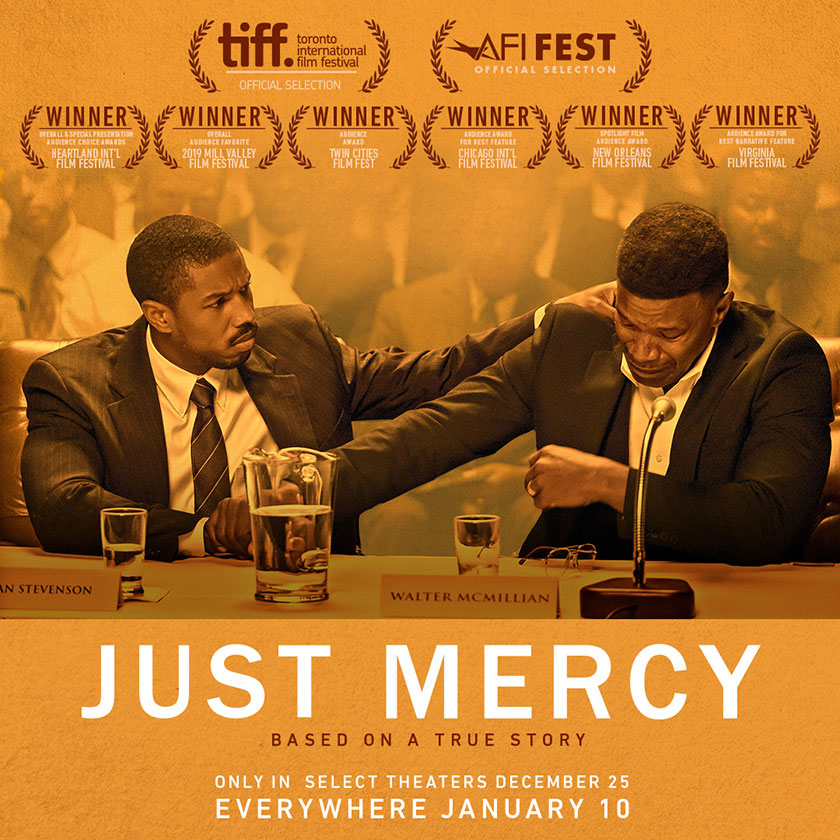The legal drama tells the true story of Walter McMillian and his attorney Bryan Stevenson.

Just Mercy is an important movie that everyone should see. Set in Alabama in the early '90s, the story is still relevant for Americans, since our country only has about 4% of the world's population but almost 20% of the global prison population.
From the official Just Mercy website:
After graduating from Harvard, Bryan (Jordan) had his pick of lucrative jobs. Instead, he heads to Alabama to defend those wrongly condemned or who were not afforded proper representation, with the support of local advocate Eva Ansley (Larson). One of his first, and most incendiary, cases is that of Walter McMillian (Foxx), who, in 1987, was sentenced to die for the notorious murder of an 18-year-old girl, despite a preponderance of evidence proving his innocence and the fact that the main testimony against him came from a criminal with a motive to lie. In the years that follow, Bryan becomes embroiled in a labyrinth of legal and political maneuverings, as well as overt and unabashed racism as he fights for Walter, and others like him, with the odds—and the system—stacked against them.
Starring Michael B. Jordan, Jamie Foxx, and Brie Larson, and directed by Destin Daniel Cretton, the film is based on Bryan Stevenson’s memoir of the same name. Now playing, Just Mercy is distributed by Warner Bros. Rated PG-13 for thematic content, including racial epithets.
—Bryan
A CLASSIC UNDERDOG STORY
Moviegoers will recognize the actors Jordan and Larson from their blockbuster superhero films Black Panther and Captain Marvel. Those movies also touched on themes of justice and oppression; however, Just Mercy is a much quieter film. There are no epic battle scenes, no costly CGI. Our underdog heroes do not have supernatural abilities, but that doesn't mean their fight is any less epic.
Veteran actor and fellow Marvel actor Jamie Foxx (The Amazing Spider-Man 2, Ray) plays Walter McMillian, a man falsely imprisoned as an "easy solution" for a heinous crime. Finally, Rob Morgan (Mudbound) and O'Shea Jackson Jr. (Straight Outta Compton) play fellow death row prisoners serving alongside Walter; Karan Kendrick (The Hate U Give) is Minnie McMillan, Walter's wife; Rafe Spall (The Big Short) portrays District Attorney Tommy Chapman; and scene-stealer Tim Blake Nelson (Wormwood, O Brother Where Art Thou?) is Ralph Myers, the man upon whose testimony Walter's conviction rests.
This is a world of fear and oppression. The prisoners Bryan serves know they stand condemned, not just for their alleged crimes, but because of discrimination. Bryan hears their stories of improper and unfair treatment by lawyers and judges. It is the unjust treatment and lack of respect for the prisoners' inherent human dignity that drives Bryan and the film.
A CONSTITUTIONAL RIGHT TO JUSTICE
Much has already been said about the film's focus on the death penalty and its frank depictions of racial injustice. The film will no doubt challenge viewers to examine their own convictions regarding such issues. But the heart of the film is the constitutional right to fair representation throughout a criminal proceeding.
The Sixth Amendment to the U.S. Constitution states,
In all criminal prosecutions, the accused shall enjoy the right to a speedy and public trial, by an impartial jury of the State and district wherein the crime shall have been committed, which district shall have been previously ascertained by law, and to be informed of the nature and cause of the accusation; to be confronted with the witnesses against him; to have compulsory process for obtaining witnesses in his favor, and to have the Assistance of Counsel for his defence." (Emphasis added.)
In an interview with 60 Minutes that is meticulously recreated in the film, District Attorney Tommy Chapman checks off a list of reasons why he will "be comfortable" if Walter is executed: "He had his day in court, he was tried by a jury, and they heard a testimony, and they believe it." For the State of Alabama, Tommy's character , justice has been served because the first half of the Sixth Amendment has been carried out.
But it is the second half of the amendment that Bryan and his team focus on. Is justice possible when a defendant is guilty until proven innocent? As Bryan speaks with witnesses and begins to break down the case, he and the audience become convinced of Walter’s innocence and that the state and its criminal justice system are grossly at fault.
—Bryan
JUSTICE, MERCY, AND UNMERITED GRACE
Just Mercy is an anomaly in the entertainment industry. It does not seek to thrill or shock its viewers. Rather, it's an altar call for Americans to embrace justice, mercy, and grace.
Without sounding preachy or overly pious, Just Mercy challenges moviegoers to remember that everyone has value. That no one benefits when injustice is a means to an end. That it takes great courage to stand for what is right in the face of oppression. And finally, that all of us—prisoner or officer, black or white—are worth more than the worst thing we've ever done.
Image provided by Represent Justice.
ANSWER THE CALL
Crime demands a response. However, our country's current approach to crime and incarceration often, exacts revenge instead of accountability, fails to make our communities safer, and neglects the needs of victims.
Prison Fellowship® invites you to join us to build a new approach—one that validates those victimized by crime, transforms those responsible for crime, and encourages communities to play a role in creating a safe and just society.
As a Prison Fellowship Justice Ambassador, you can inspire the Church, change the culture and advance justice reform in the United States.
DID YOU ENJOY THIS ARTICLE?
Make sure you don't miss out on any of our helpful articles and incredible transformation stories! Sign up to receive our weekly newsletter, and you' ll get great content delivered directly to your inbox.
Your privacy is safe with us. We will never sell, trade, or share your personal information.